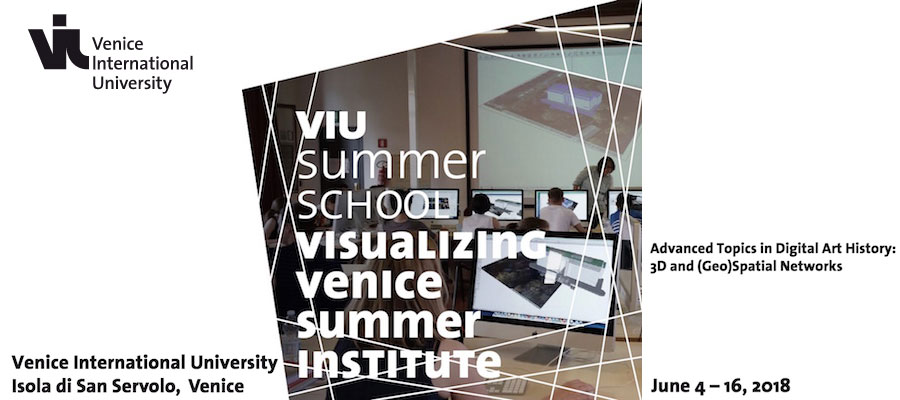Visualizing Venice Summer Institute, Venice International University, June 4–16, 2018
Digital Technologies for Historical and Cultural visualization are transforming the ways that scholars can study and represent works of art, as well as growth and change in urban spaces and structures.
With the support of The Getty Foundation as part of its Digital Art History initiative, The Wired! Lab for Digital Art History & Visual Culture at Duke University, the University of Padua‘s Architecture and Engineering program and Venice International University are collaborating on a Summer Workshop that will support interdisciplinary teams focused on the hard questions of Digital Art History as a discipline, a set of methods, and a host of technical and institutional challenges and opportunities.
After five editions of two-weeks summer workshops introducing concepts and methods for digital art and architectural history through hands-on tutorials and collaborative project development, this year the program will focus on advancing the field of digital art and architectural history through a combination of project-sharing, technology exploration, and academic discussion.
Interdisciplinary teams of participants will gather from June 4-16, 2018 in Venice, Italy at Venice International University, with follow-up activities taking place over the course of the 2018-19 academic year, and leading into a follow-on gathering in Summer of 2019, which will operate as a writing and digital publication workshop, building upon work done over the course of the year by the project teams and in collaboration with our wider network.
The focus for the 2018 course is 3D AND (GEO)SPATIAL NETWORKS. It combines several overlapping areas of special interest to scholars in art history that map directly onto our team’s expertise in geospatial mapping, GIS, and 3D representation. First, digital mapping and spatial analysis have become important ways to contextualize and frame the production of art historical objects, as well as their circulation and reception. Understanding artifacts on-site, how they operate, are experienced and change over time aid the processes of their analysis and interpretation of cultural and aesthetic significance. Mapping influence networks, charting the flow of goods and services, or tracking cost-paths have become recognized techniques in the field. Adding a 3D dimension further enriches the field by enabling the research to place 3D models within such contexts, to perform viewshed analyses, and to construct spatially organized database front ends to rich collections of primary and secondary source materials. These latter benefits are not trivial as they allow researchers to aggregate their research projects and data sets, allowing the field to build more collectively than ever before. Further, by making these resources available via the web we have the opportunity to use some platforms for scaling up via integrated datasets and using the platform itself for digital storytelling and as a complement to written scholarship.
The target audience for the workshop will be established teams of scholars (faculty, researchers, post-doctoral and PhD participants) and their technical partners working in the field of digital art history. We anticipate approximately seven (7) teams of 2 – 3 person each, drawn from an international set of collaborators focused on scaling up an existing Digital Art History project, with special attention to projects focused on the intersection of mapping and modeling, and those thematized around Visualizing Cities.
Applicants are expected to have a Digital Art History project underway and a key set of research questions identified, as well as to have demonstrated some progress in developing their research program. Alumni of past Visualizing Venice Summer Workshops will be encouraged to apply on behalf of their research teams. Ideal teams will reflect the following expertise, collectively:
- Art Historical Expertise
- Geospatial/GIS Expertise
- Expertise in 3D Modeling and Representation
- Developer/Programmer Expertise
- Project Management Expertise
